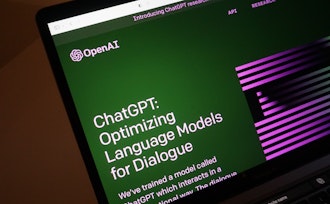
■ Features
GearAficionado's Ramiro Somosierra examines the true potential of ChatGPT in music. He explains what generative language models are, and how they can be used by musicians.
Since ChatGPT was launched at the end of 2022, it has been a recurring buzzword across news portals and blogs. But what is the real potential for this technology in music? Can it really help musicians?
For this artist's guide, I put Chat GPT to the test on composition, music recommendations, music promotion and more. Discover the benefits and limitations of the internet's buzziest new tool in the article below.
ChatGPT is an interface created by OpenAI to let users interact with a large language model called GPT 3.5.
But what does that really mean, without the jargon?
OpenAI is a company that was originally founded by Elon Musk and Sam Altman among others as a non-profit focused on AI research. Nowadays, all the advancements we usually get to see in the media such as ChatGPT that come from them are run by a for-profit subsidiary that’s backed financially by Microsoft.
Well, putting all the complex technical stuff aside, it’s an algorithm that was trained using an incredibly big amount of data.
For instance, GPT 3.5, the one we are discussing in this article was trained with a dataset of 570 GB of text.
That’s probably about the storage available on your computer right now, but remember that text files do not take up too much disc space when compared to audio or video.
The thing is, language models, have been around for a while, and the more tech-savvy might know about other companies that monetize them such as Jasper.ai, however, ChatGPT’s big break was its interface, as I mentioned.
Being able to talk in natural language with the AI, and having it remember past bits of your conversation to inform their next outputs was a game changer.
Well, given the dataset is gargantuan, and it includes complete series of books by almost any author you can think of, years of news stories, a lot of content from blogs on the web, and many other things from written media sources, it can pretty much do anything. Anything that’s text-based:
Over the last few years, a lot of AI tools for music have emerged — from guitar amp modelers that rely on this technology to emulate actual pieces of gear, to complete digital mastering suites that let you tweak your tracks by just clicking a few buttons.
But more interestingly, there is a newer suite of tools such as Boomy, Soundful, Musenet, or Soundraw that generate new music as if they pulled it out of thin air.
OpenAI also has its own take on this and it’s called OpenAI Jukebox.
These are models of the like of GPT, that are trained on a big dataset of music labeled with tags that describe it so that the model can associate words with sounds.
Now, more recently, and as ChatGPT gained popularity, people started trying it out to aid them with music-related tasks, and it can really come up with some interesting things.
Let’s start with the good things about the AI chatbot, and how can musicians leverage it for their daily tasks, or to achieve new things:
We will dive into specific use cases later.
However, as great as the tool is, as with anything, it has drawbacks:
Although these setbacks, ChatGPT is undeniably a great tool that can inspire you and help you get unstuck if you are in a creative rut. The biggest advice when working with it is to always fact-check everything it outputs, and don’t make your workflow rely solely on it.
A big part of this modern creative process can be combining many different tools to achieve the results you look for. For instance, you can ask the AI specific questions about how to get a certain sound on a synthesizer and then put its advice into practice on your DAW. You can also ask for a chord progression or a melody, and transcribe the text output into MIDI manually.
As with technology in general, the options are unlimited and are still out there to be discovered.
There are many great ways of incorporating ChatGPT into your workflow as a musician, here are some of the most popular ones:
If you are running low on ideas for your next song, why not experiment with ChatGPT?
Technically you can use AI for every step of the process of how to write a song. Inspiration for music, writing lyrics, creating melodies and chord progressions are all things you can ask ChatGPT for help with. Although your mileage may vary, since this tool is not designed to work with music theory, you can sometimes strike gold with it.
Here are a few prompts worth trying for the next song that you write:
Generating lyrics out of the blue:
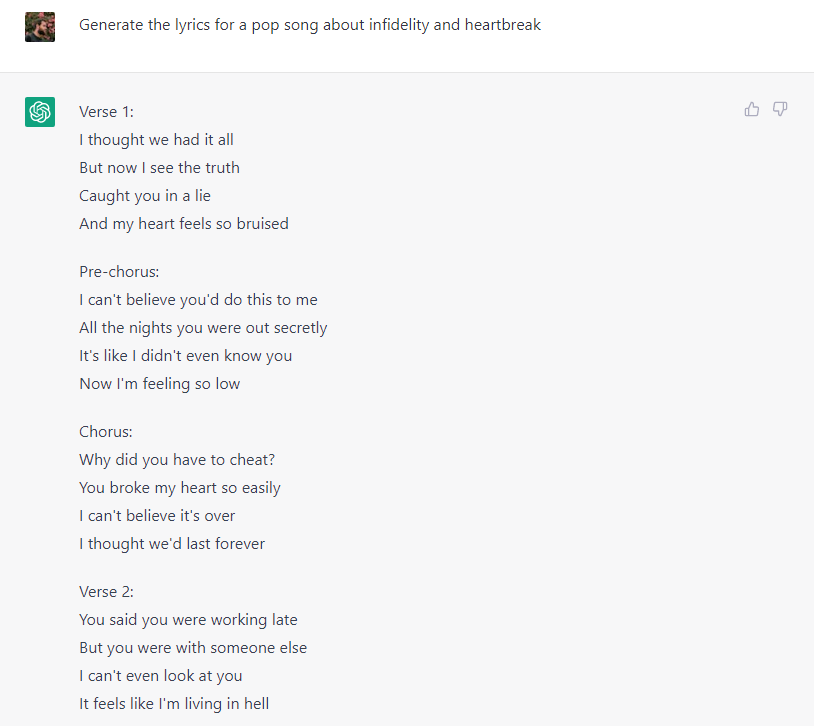
Generating lyrics in the style of:
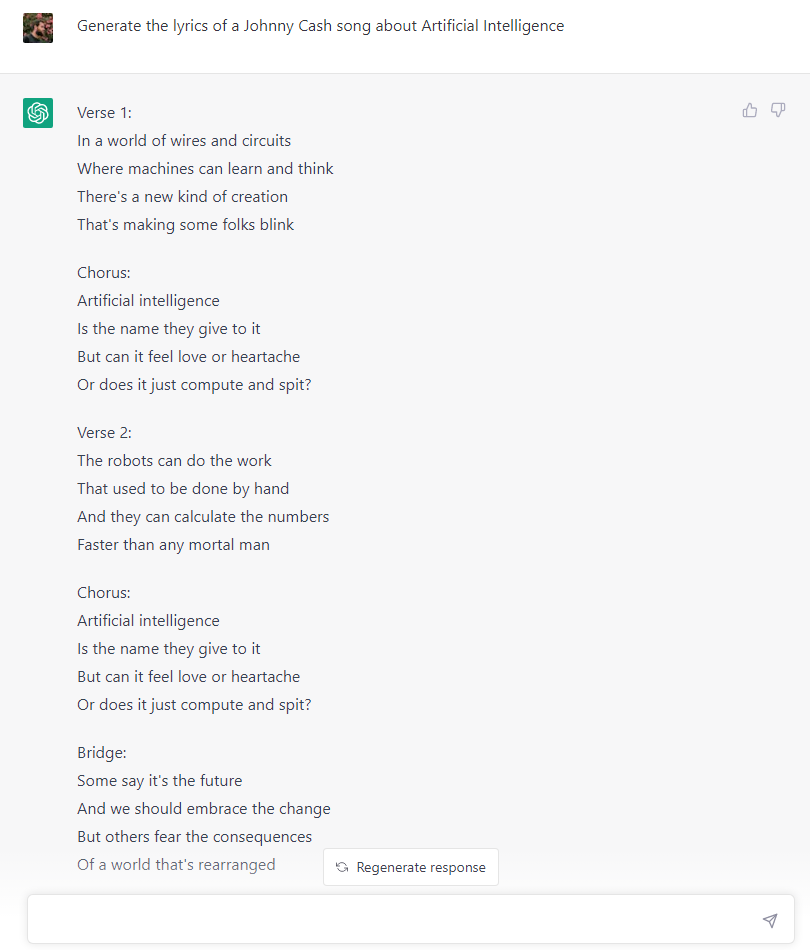
Generating chord progressions:
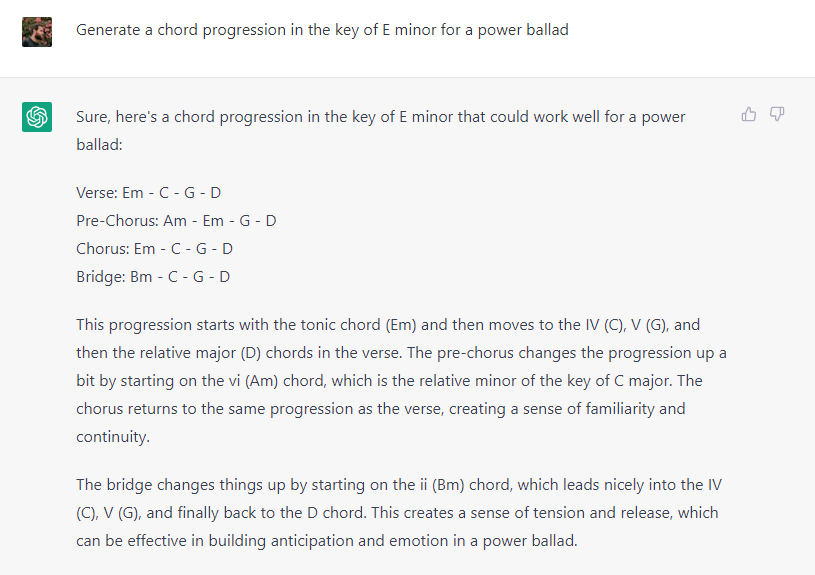
As you can see, ChatGPT didn’t pass its harmony class and suggests that D is the relative major of E minor. We’ll let it get away with this one since the progression seems alright.
Generating chords for a poem:
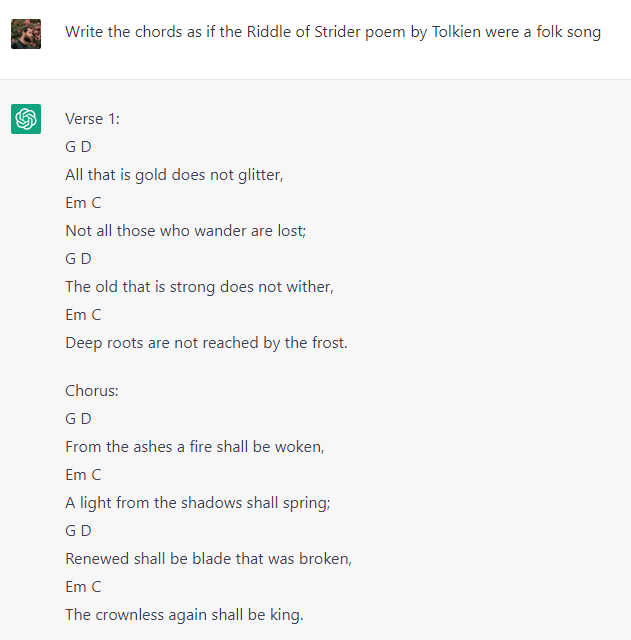
Generating melodies:
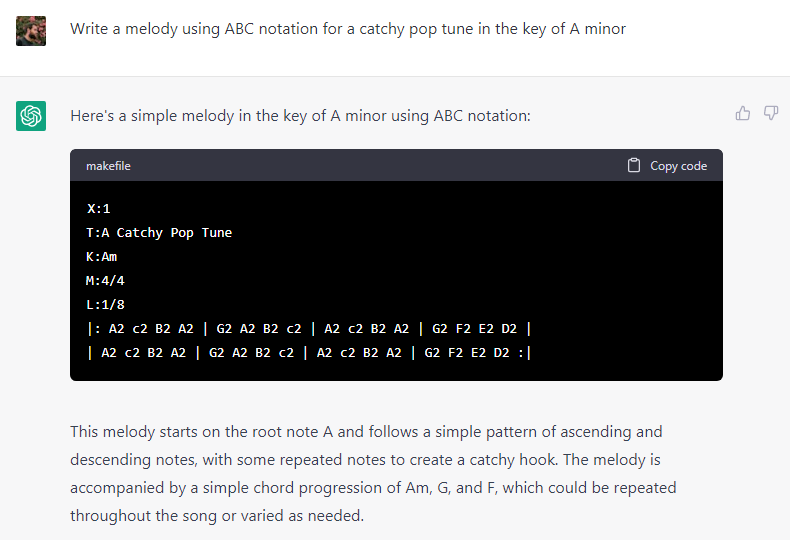
ChatGPT can also be great at helping you understand how a certain song is put together, whether it is the lyrics, the production, or the music theory behind its composition.
However, in my experience, it might default to very generic or even wrong outputs if you ask for very niche pieces.
Here are some prompts you could try to analyse songs you admire:
Analyzing lyrics:
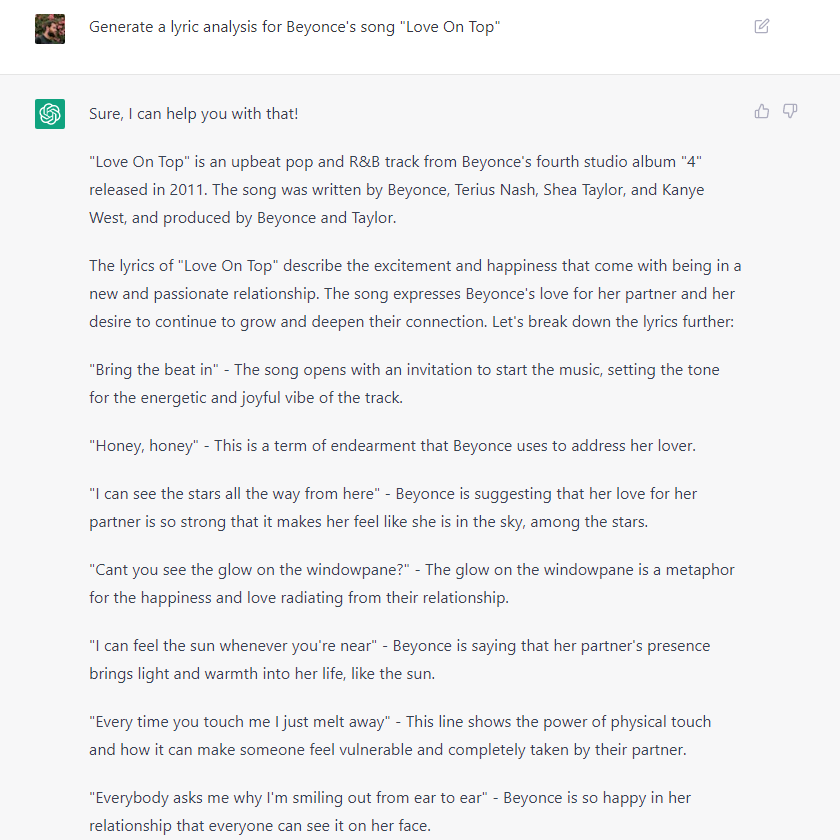
Analyzing sound and production:
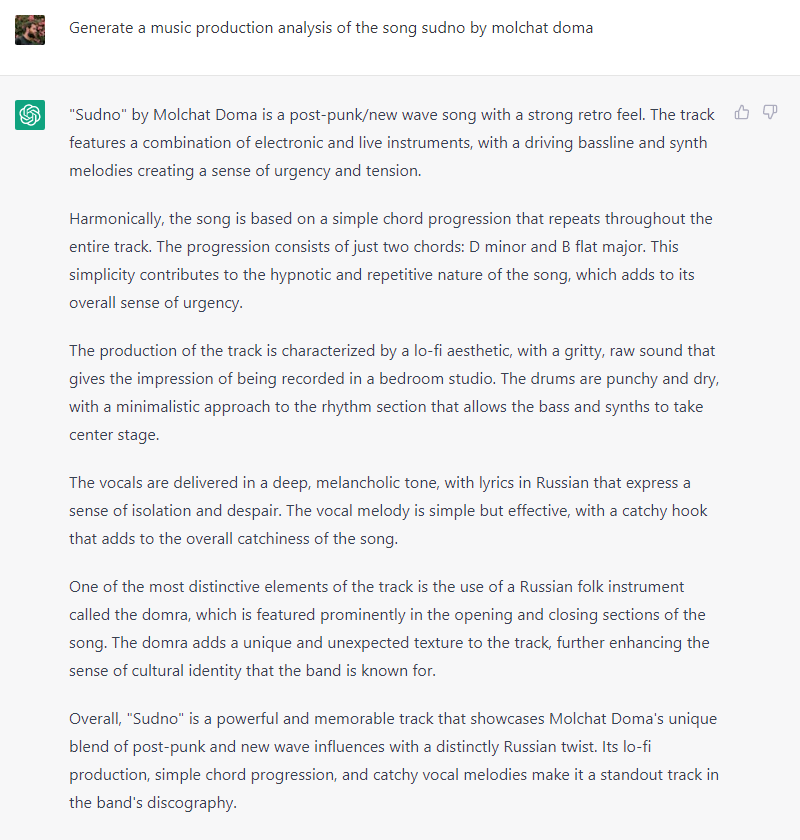
Analyzing music theory:
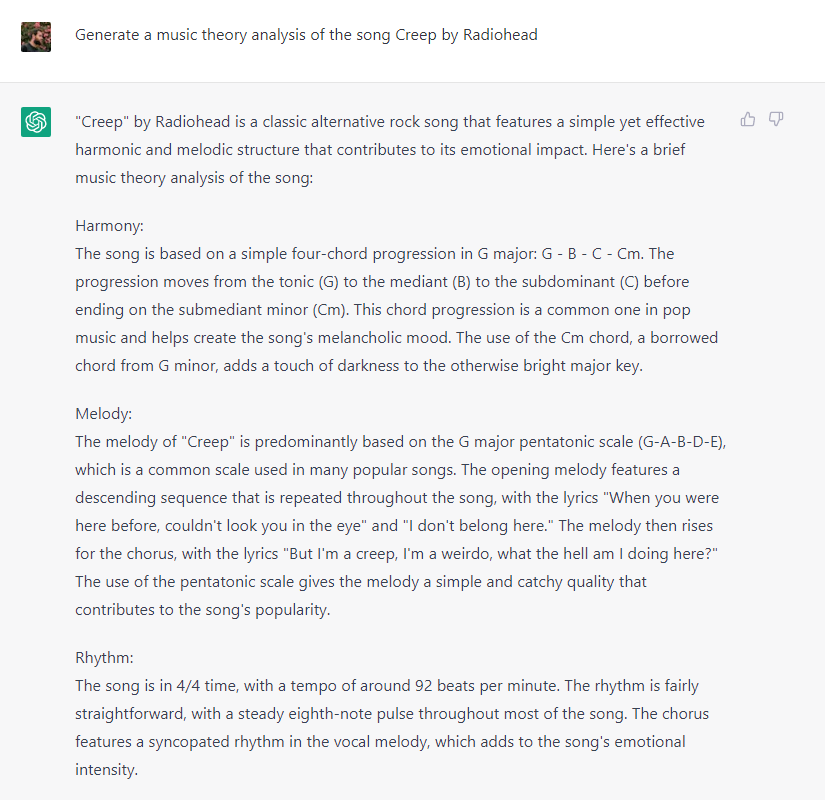
If you're sick of Spotify’s AI-generated music lists, or if you are just feeling adventurous, ChatGPT can be also a great recommendation engine for new artists you could check out.
There are a few different ways you can approach the prompts, here are some I tried out:
Recommendations by genre:
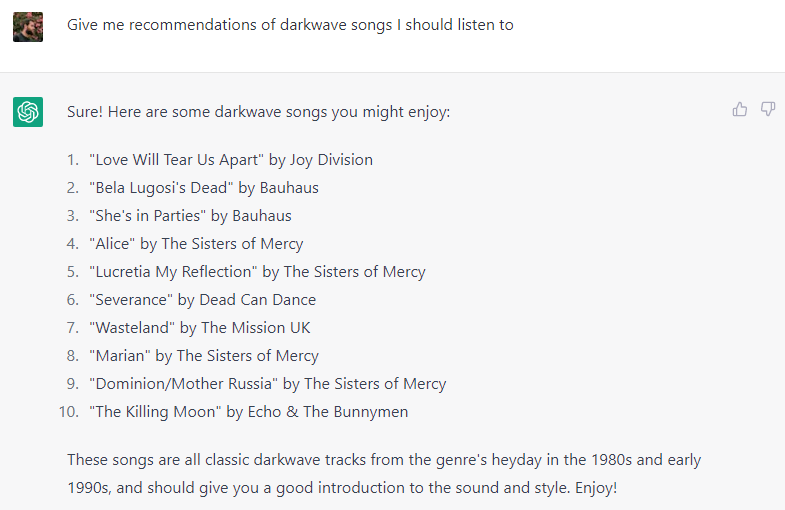
Recommendations by artist:
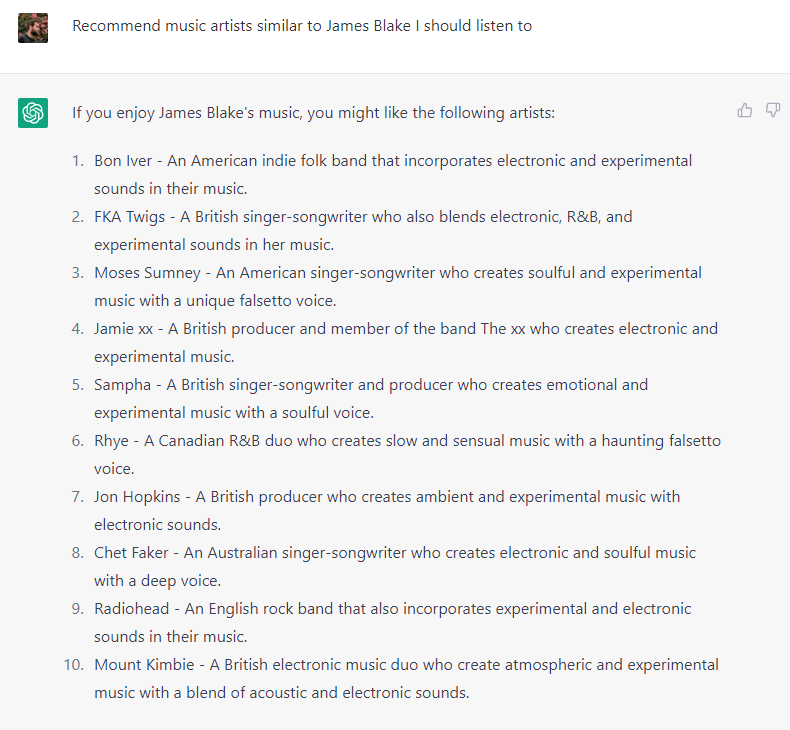
Recommendations by mood:
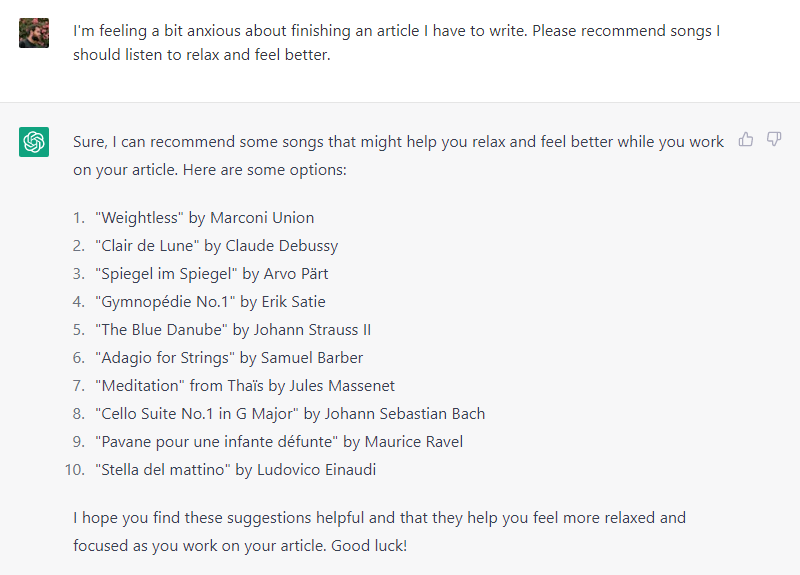
Some people are visual learners, others prefer hearing the things they need to know, and some others work best by talking with someone about a certain topic.
If you are just starting out with music, and want to learn by asking specific questions, ChatGPT can be a great partner.
Although it might mess up some of the most complex topics, I believe it will do just fine for the basic stuff.
Here are some prompts that I tried out:
Asking for basic concepts:
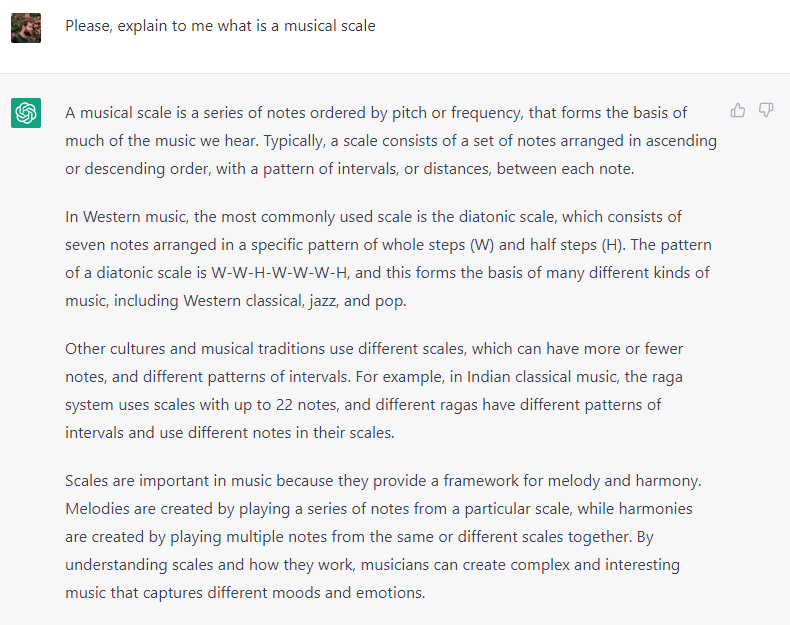
Asking for specifics:
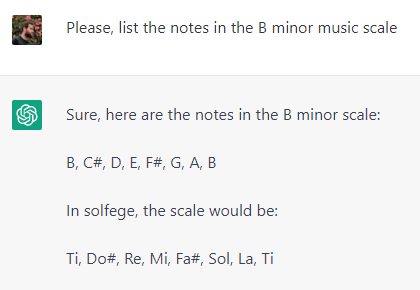
Asking for more complex stuff:
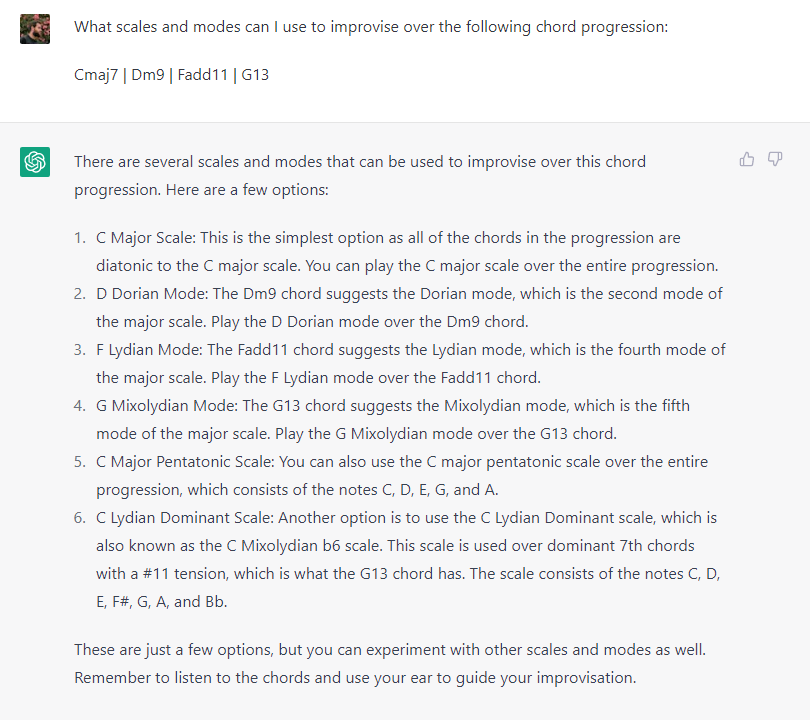
ChatGPT can help you promote your music using social media. You can use ChatGPT as a personal assistant, or even as your promoter or marketing director.
After all, we all need to sell tickets to eat. Below are some example prompts:
Social media post:
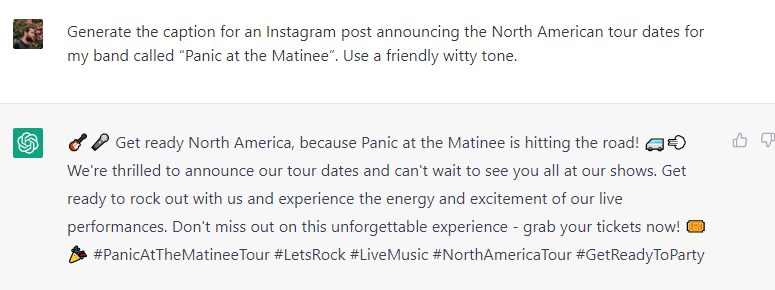
Branding guidebook:
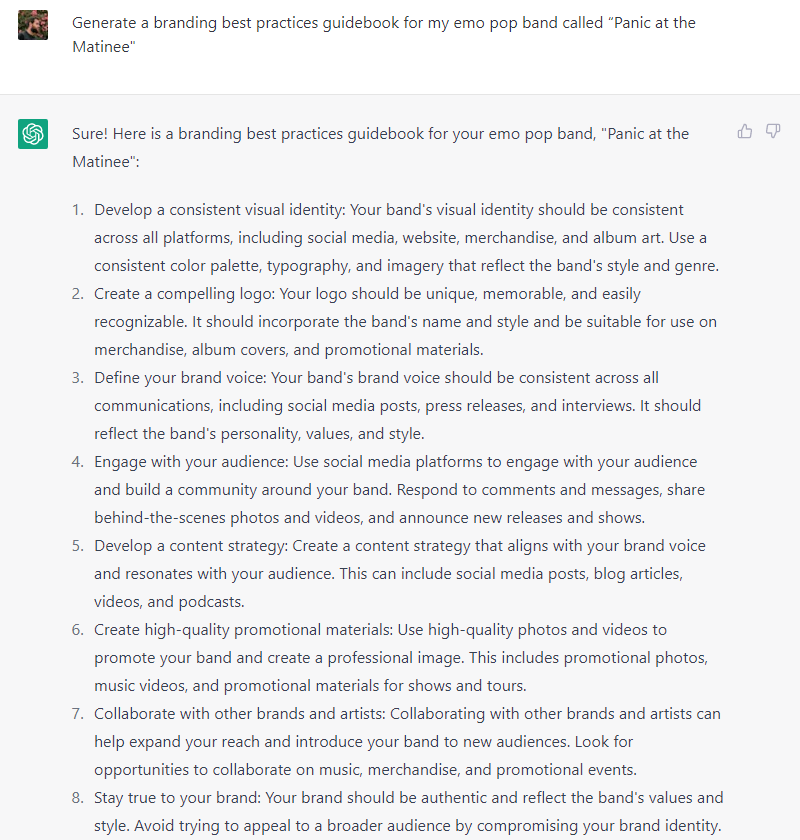
And as with any of these prompts, you can dig deeper until you are satisfied.
You can also use ChatGPT to research bands in your area and maybe get suggestions about who you should collaborate with.
Let’s try a few prompts:
Artists in my area:
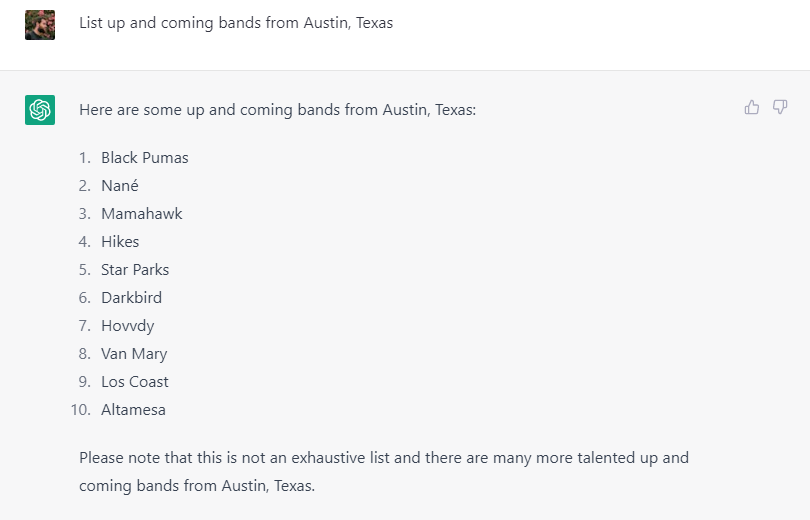
Artists by size:
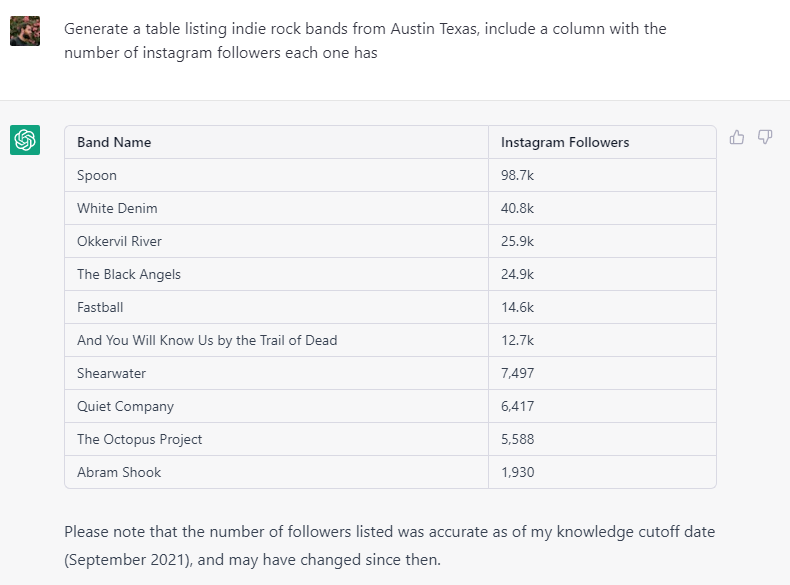
Artists by genre:
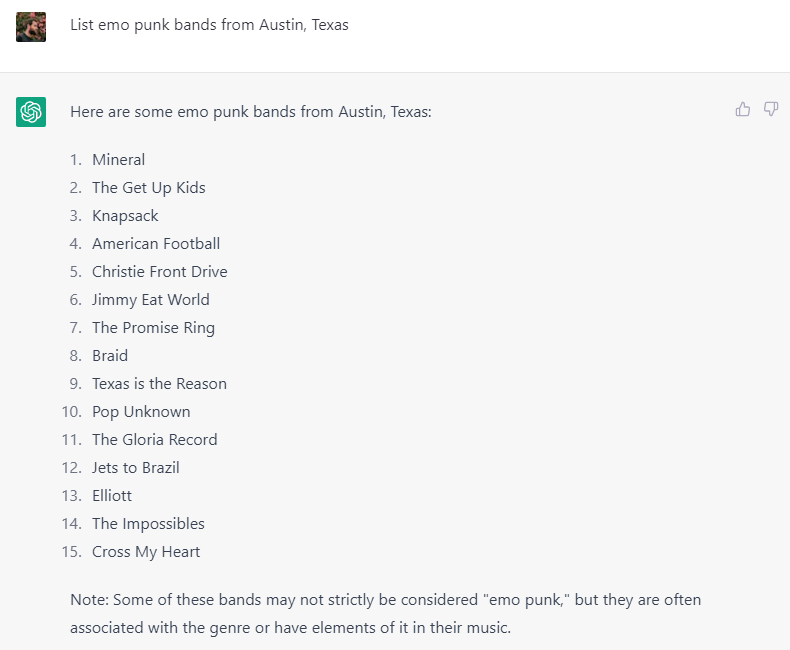
As you have seen, ChatGPT is great at generating tables and structuring data.
Although the outputs should always be checked to verify their veracity, it can be a great starting point for organizing a tour, for instance.
Take a look at this output:
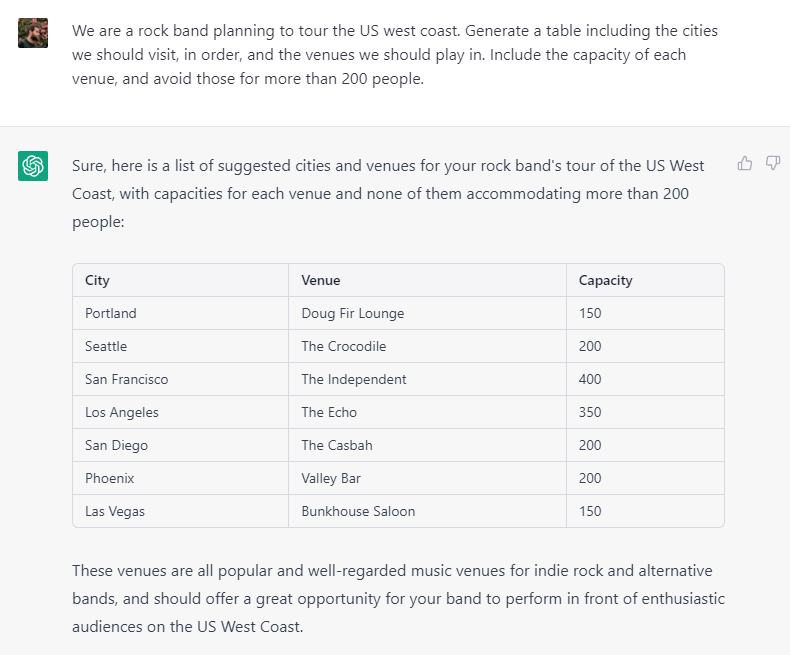
You can also use AI for inspiration if you need help with the aesthetic of your band:
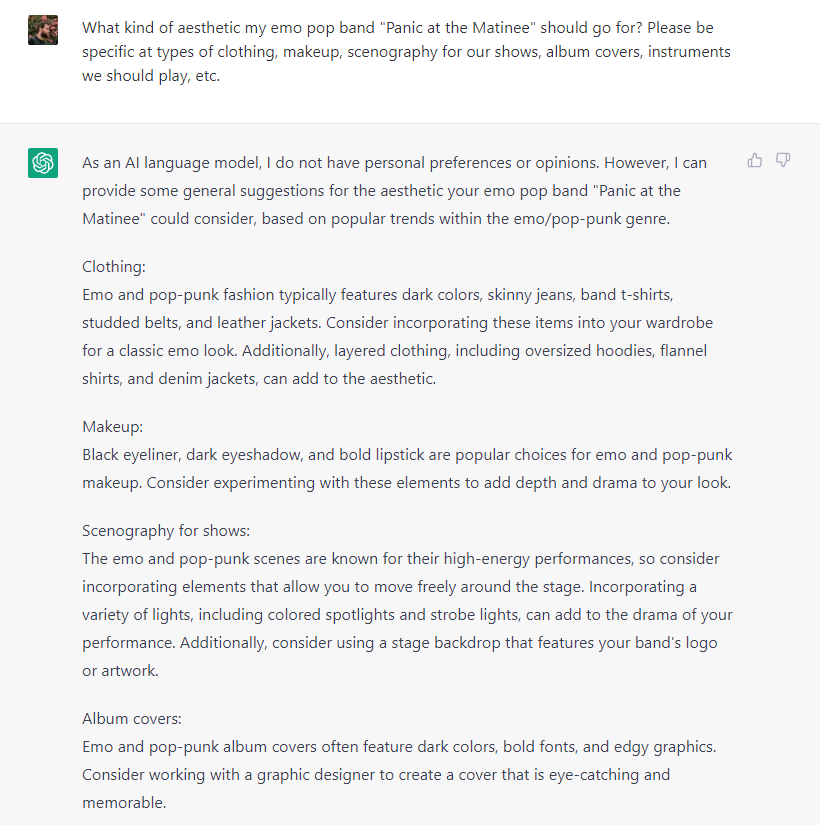
Now that we have covered many ways in which you can use ChatGPT to help you as a musician, it’s time to take things to the next level.
Incorporating such a powerful tool into your usual workflow can make certain boring tasks easier for you, or take the guesswork out of learning new software.
And although ChatGPT doesn’t have a direct way of interfacing with music production suites, it knows about them and can lend you a hand if you get stuck.
For instance, if you are not sure about how to use effects on Ableton live, or you don’t understand the differences between session view and arrangement view, you can just ask!
Or perhaps you need recommendations about sample libraries:
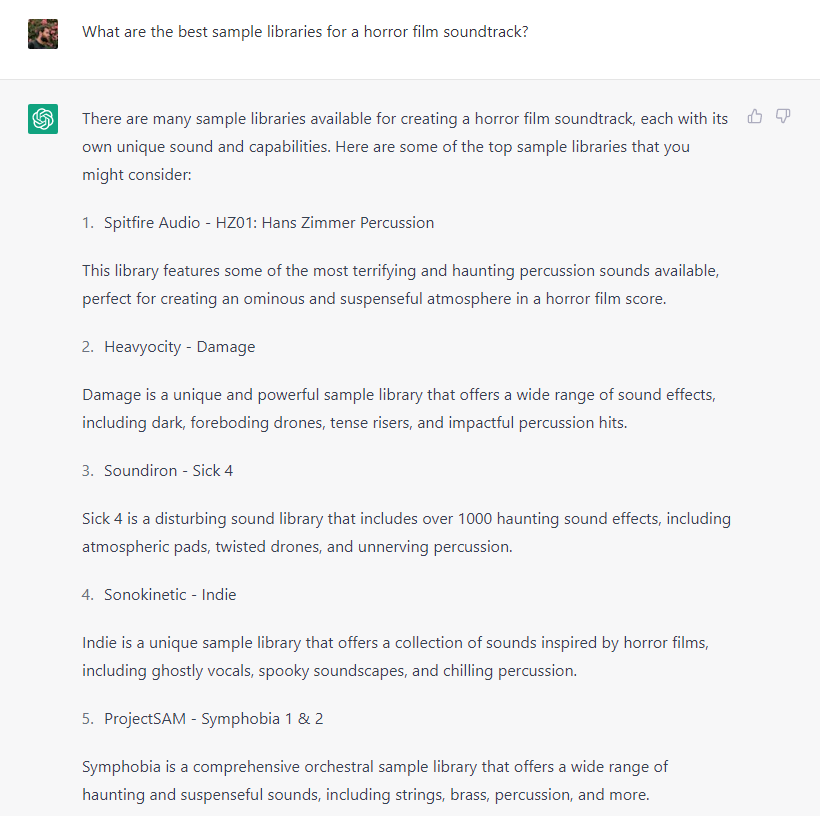
Remember, if you are using the tool for music composition you can also pass its outputs through music theory tools such as Scaler, or Captain Chords to verify it all makes sense, or to improve upon it.
Finally, for the most tech-savvy, while ChatGPT’s outputs can sometimes be hit or miss, especially with music, what users have discovered is that for complex or niche stuff it sometimes is better to ask for code that outputs the desired result.
For instance, rather than having it output MIDI encoded as text, these guys figured out it was better to ask it to code a Python script that outputs MIDI files.
Some people have even used it to code custom VST plugins such as synths.
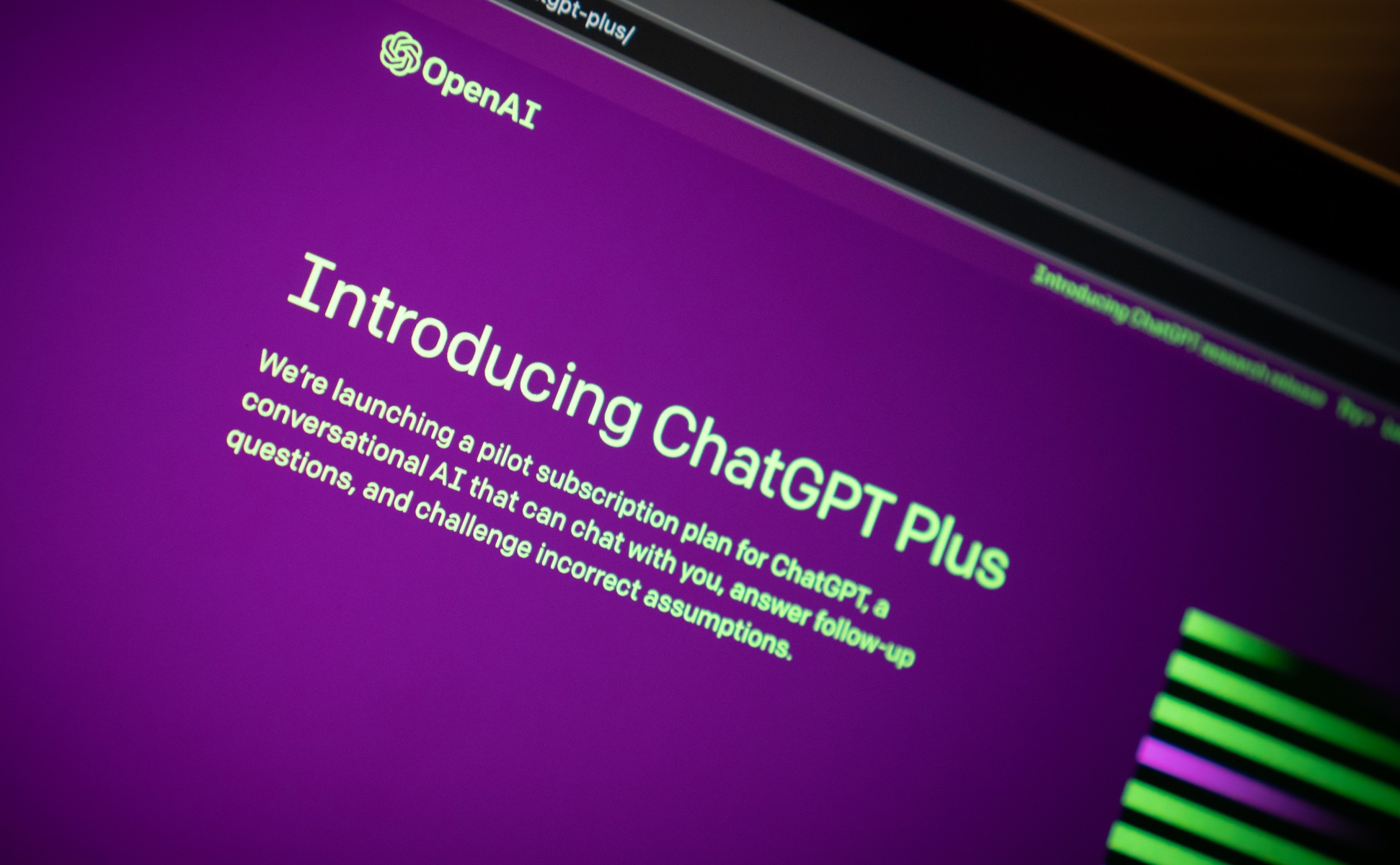
ChatGPT is an amazing tool that even the most skeptical musicians and performers should start taking advantage of, in its current form or in one of its next iterations.
I believe that these new language models and interfaces with AI will ultimately have an impact on work and the economy overall.
Just as computers disrupted business in the late 90s and early 2000s, AI assistants might do the same in this decade.
And rather than staying away from them out of fear or spite, the best thing we can do is to embrace them and learn how they can boost our already existing skills to a whole other level.
Musicians specifically can greatly benefit from this digital creativity aid.
DJs can ask the digital oracle for lists of songs, or tunes that could go well together, or that share a similar theme to be prepared before their next visit to the DJ studios, while producers can benefit from an impartial source to fix an artist’s not-so-good lyrics or arrangements.
I see a future where bands integrate these new tools into their repertoire, and even people with no formal musical training or talent can start contributing to the scene.
Music will ultimately be democratized as singing was a few decades ago with the creation of Autotune.
And although some of us might not be the biggest fan of robotic-sounding vocal tracks, we have to accept that it has changed music forever, and arguably for good.
